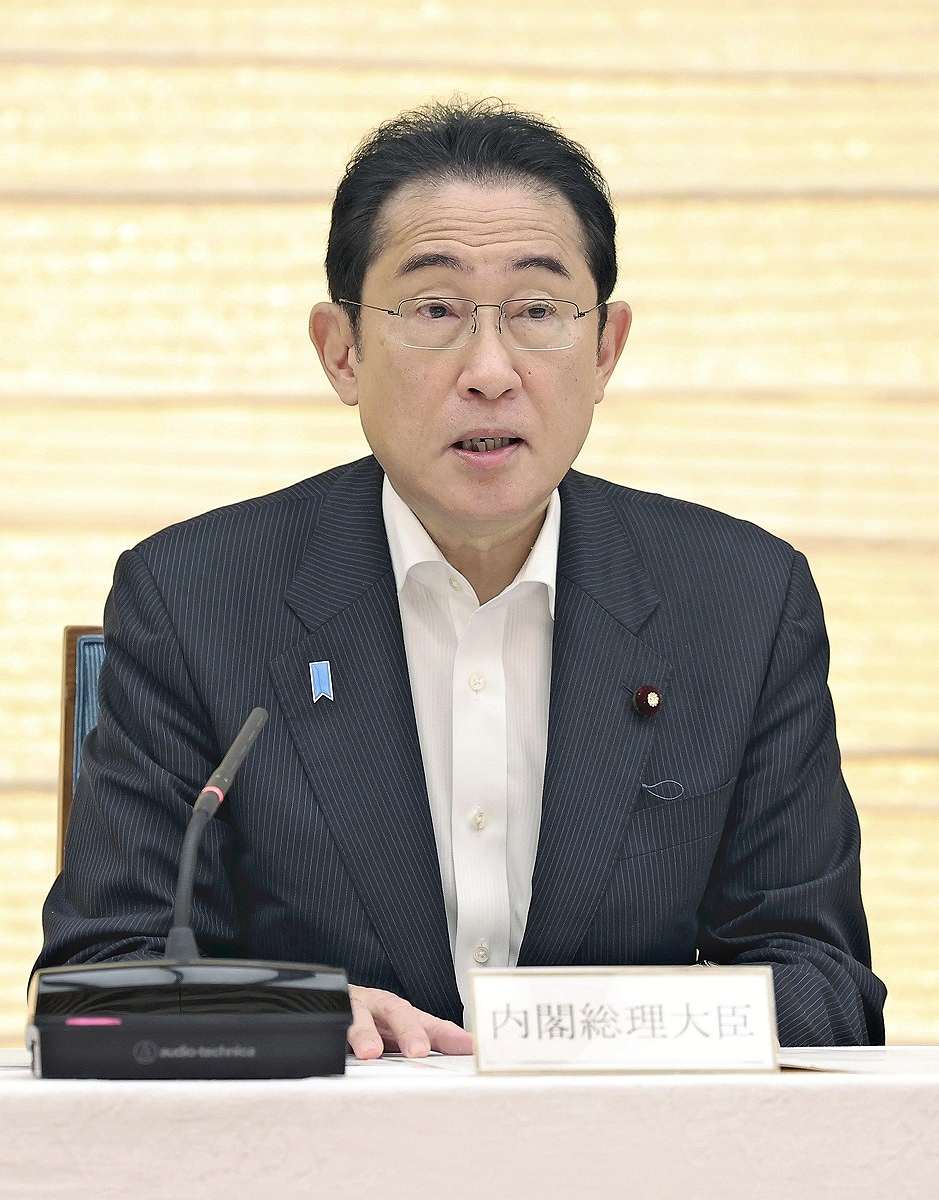
Prime Minister Fumio Kishida calls for the ratio of female executives at companies to be increased, on June 13 at the Prime Minister’s Office.
8:00 JST, September 9, 2023
Two men in suits who seem to be in their 30s are shoulder to shoulder with beer mugs in their hands and big smiles on their faces. This image on a poster for a famous beer maker in Japan caught my eye at a casual restaurant during my summer vacation. Judging from their appearance, they are probably colleagues at the same company. The caption, “This moment is absolutely wonderful,” seems to express the joy of sipping a cold beer after a long day.
Looking at the posters of such international brands as Corona, Budweiser or Heineken, which compete for the top share of the world beer market, you will find many stylish photos showing only beer bottles, or photos of men or women in swimsuits on the beach drinking beer. But you can hardly find any images of people enjoying drinking with colleagues in suits.
Actually, most Japanese people would have a positive response to the Japanese beer company’s poster, as it shows a typical image of “nominication,” a strong and persistent element of the salaryman culture that supported Japan’s high economic growth in the latter decades of the 1926-89 Showa era. Nominication is Japanese slang for “building a good relationship by drinking together.” It combines the Japanese word “nomu” (drink) and the English word “communication.” Many people go out drinking with colleagues several times a week and wash away the fatigue of the workday by drinking cold beer. It is customary for workers to vent their stress by talking to each other and complaining about bosses, and they often end up coming home late at night.
Nominication has existed since the Showa era, but it has undergone a change. A 2022 survey by Japan Life Insurance found — for the first time — that fewer than 50% of respondents described nominication as “necessary.” By age group, the percentage of those who said that it was unnecessary was the highest among people in their 20s, at 58%.
Asked why it was unnecessary, 45% said it was because such drinking sessions were not carefree occasions, and 34% said it felt like an extension of their work. Due to the coronavirus pandemic, it seems that many people said it was unnecessary from the viewpoint of infection prevention, but there has been a larger shift in attitudes regarding drinking with colleagues, especially among the younger generation who put more emphasis on their private lives.
Interestingly, this change parallels a trend of younger people working fewer hours.
In Japan, large companies from April 2019 and small and medium-sized enterprises from April 2020 have been required to limit annual overtime work to 360 hours or less in principle. This is because excessively long working hours hinder the motivation of workers, harm their health, and increase the possibility of karoshi, or death from overwork. As a result of this legislation, working hours in Japan, which were by far the highest of any developed country, have decreased overall. According to an Internal Affairs and Communications Ministry survey in 2022, by generation, men aged 25-34 work 2,120 hours per year, which is 3.7% less than the figure for those aged 45-54. The rate of decrease in working hours was 8.6% for the 25-34 age group, 7.9% for the 35-44 age group, and 5.7% for 45-54-year-olds, indicating that the younger generation has seen the largest decrease since 2013.
Although long working hours are being corrected, it doesn’t necessarily lead to men’s increased participation in housework and childcare. According to a 2021 tally by the Organization for Economic Cooperation and Development (OECD), Japanese men spent just 41 minutes per day on unpaid work such as housework and childcare, the lowest in major developed countries, but did 452 minutes of paid work, the highest among major developed countries. In addition to this data, according to a survey conducted by the National Institute of Population and Social Security Research in July last year, wives are responsible for 80% of housework and more than 70% of childcare.
Why do Japanese men participate so little in housework and childcare? There seem to be three main reasons.
The first reason is the model division of family roles based on gender, in which “men should work outside and women should take care of the family at home,” a mentality that became common during the period of high economic growth in the 1950s to ’70s. During this period in the Showa era, the “livelihood security” system was centered on stable employment and company benefits for male full-time employees and functioned on the premise that women would become full-time housewives. Even now — when the bubble economy has collapsed, the corporate livelihood security system has contracted, and two-earner households have increased — we have not been able to escape the mindset of a gender-based division of roles.
The second reason is the outstanding length of working hours for men. While husbands work long hours and wives do most of the regular household work, it is extremely difficult to make women’s empowerment and men’s participation in the family serve as two wheels of a cart. Correcting the long working hours of men, which is currently advancing, will not only prevent deaths from overwork, but will also promote women’s participation in society.
The third reason, it’s sad to admit, is the low housework skills of Japanese men. As mentioned above, there was a strong sense that women were responsible for family work, so there was little awareness that “family life is a cooperative effort between men and women,” which led to a situation in which many middle-aged and elderly men are not even able to cook. On the other hand, since learning basic life skills in home economics class has been compulsory for male students in junior high school since 1993 and in high school since 1994, surveys have shown that younger generations are taking the view that roles in family life need not be determined by gender.
Prime Minister Fumio Kishida emphasized that he would “accelerate the promotion of women in companies,” and has set a goal of increasing the ratio of female executives in companies listed on the Prime section of the Tokyo Stock Exchange to at least 30% by 2030 in the “Women’s Edition of the Basic Policy.” With more than 12 million two-worker households emerging, in which women still do the majority of housework and childcare, can the government achieve this goal? If the government really supports the active participation of women in society, it will change the conventional value that “men work outside and women take care of the family” and create a society in which it is natural for both men and women to engage in unpaid work such as housework and childcare.
People in their 20s who feel that “nominication” is not really necessary and do not tolerate long working hours will create new values about two-worker households and ways of working in Japan. In the coming decade or so, when many men will be engaged in household work and childcare, beer companies might even change their poster designs.
Political Pulse appears every Saturday.

Yukiko Ishikawa
Ishikawa is a staff writer in the Political News Department of The Yomiuri Shimbun.
Top Articles in Editorial & Columns
-

Riku-Ryu Pair Wins Gold Medal: Their Strong Bond Leads to Major Comeback Victory
-

40 Million Foreign Visitors to Japan: Urgent Measures Should Be Implemented to Tackle Overtourism
-

University of Tokyo Professor Arrested: Serious Lack of Ethical Sense, Failure of Institutional Governance
-

China Provoked Takaichi into Risky Move of Dissolving House of Representatives, But It’s a Gamble She Just Might Win
-

Policy Measures on Foreign Nationals: How Should Stricter Regulations and Coexistence Be Balanced?
JN ACCESS RANKING
-

Japan PM Takaichi’s Cabinet Resigns en Masse
-

Japan Institute to Use Domestic Commercial Optical Lattice Clock to Set Japan Standard Time
-

Israeli Ambassador to Japan Speaks about Japan’s Role in the Reconstruction of Gaza
-

Man Infected with Measles Reportedly Dined at Restaurant in Tokyo Station
-

Man Infected with Measles May Have Come in Contact with Many People in Tokyo, Went to Store, Restaurant Around When Symptoms Emerged






















